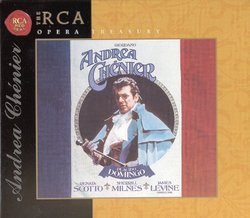| All Artists: Umberto Giordano, James Levine, Plácido Domingo, Renata Scotto, Philharmonic Orchestra, Sherrill Milnes, Stuart Harling, Gwendolyn Killebrew, Malcolm King, Jean Kraft, Maria Ewing, Allan Monk, Enzo Dara, Isser Bushkin Title: Giordano: Andrea Ch�nier Members Wishing: 0 Total Copies: 0 Label: RCA Release Date: 8/10/1999 Album Type: Original recording remastered Genre: Classical Style: Opera & Classical Vocal Number of Discs: 2 SwapaCD Credits: 2 UPC: 743213949925 |
Search - Umberto Giordano, James Levine, Plácido Domingo :: Giordano: Andrea Ch�nier
 | Umberto Giordano, James Levine, Plácido Domingo Giordano: Andrea Ch�nier Genre: Classical
|
Larger Image |
CD DetailsSimilar CDs
|
CD ReviewsBest studio version Mr JB | Karlskrona Sweden | 02/22/2001 (4 out of 5 stars) "Here we have Domingo & Milnes at their absolutely best. Scotto also is great, landing somewhere between Tebaldi and Callas. It's heard from the very start, Gérard's "son sessant'anni..." gives the tone to the whole performance - blood red and white hot as it is. Thereafter we're spoilt with at least ten - how often are there such a number in one opera - of melodic, dramatic and not least lovely tunes - here greatly sung by some of the last centurys greatest voices. Although I find Bjorling, Corelli and Bastianini great in their respective parts, this is THE over all best studio performance. Feel perfectly assured with this one - the only one to compete is a obscure live version with Del Monaco & Callas on the record label of Melodram (or 'Verona'). Nore Pavarotti's, nore Carreras' versions comes even close to the impact and theatrical reliability of this recording." A bit shallow, yet still thrilling Jim Player | Rochester, NY, USA | 02/08/2002 (3 out of 5 stars) "This recording came near the end of the famous Domingo/Milnes RCA recordings when they made a flurry of operas with Price, Caballé and Scotto. Here they are paired with Scotto, and led by the young James Levine with the National Philharmonic which was much used at that time by RCA and Decca.The main reasons for purchasing this album is for the leading trio in their prime, and for the enthusiastic conducting of Levine. Dramatically, it's more enthusiastic than anything else, and that can be heard right from the opening bars. The freshness and vitality is quite brilliant, and the voices are all healthy and vigorous. However, a first impression only lasts so long, for this is basically a good, but routine Chenier that merely scratches the surface of good theater. For a late 70's recording, it's quite good and worth owning, but it lacks the dramatic punch to put it over the edge.Perhaps the most notable reason to hear this is for a document of how exciting Levine's conducting used to be, before his Bayreuth years and subsequent deification at the Met. An early review stated that this Chenier sounded as fresh as if the ink were still wet on the score. What a contrast to what we have today...." The best version we'll ever get? Santa Fe Listener | Santa Fe, NM USA | 09/25/2006 (5 out of 5 stars) "I agree with both reviewers below: this 1977 performance of Andrea Chenier is the best studio version, and given the absence of tenors with Domingo's charisma, it may be the best we can expect for a long time. but this isn't just the familiar Domingo-Milnes show. By a long stretch Scotto is the best Maddalena I've ever heard. Even though she never had the strong chest tones of a true verismo soprano like Tebaldi, Milanov, or Magda Olivero, Scotto had the right attitude--she seems to be tearing her heart out. Milnes is blustery, as usual, but domingo couldn't be better as the ardent Chenier, and Levine's vigorous pacing helps to disguise the weaknesses in the music (although an audience favorite, this opera is disdained by critics, one of whom called it a garbage can filled with verismo cliches).
Among the competition, I'm aware of the Callas mono recording, a live aircheck in dreadful sound, and the Chailly-conducted set on Decca with Pavarotti and Caballe, which features the tenor is less than best voice and the soprano a bit too droopy for my tastes. So this RCA set holds it onw." |

 Track Listings (22) - Disc #1
Track Listings (22) - Disc #1
